Turtles have become an incredibly popular choice for pets in the last several years for many reasons. One of the biggest is how easy it is to care for them and how well-invested new reptile owners do with them. These friendly animals don’t ask for a lot — just the right setup, proper food, turtle costs, and some affectionate care and cleaning.
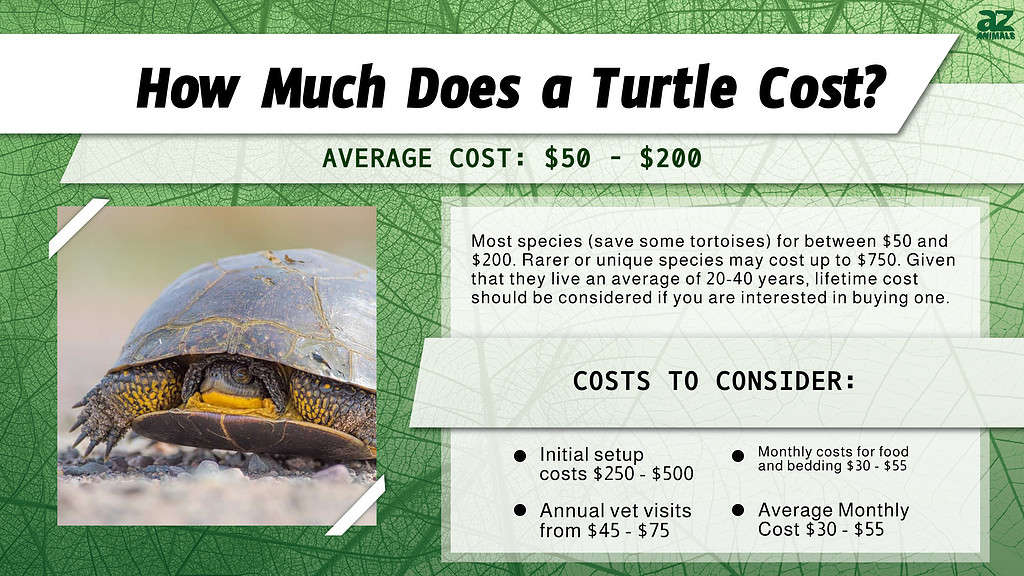
The fact that set-up fees are the highest costs for turtles and tortoises, with low monthly and annual costs, doesn’t hurt their popularity. Most folks spend up to $500 for the initial setup (though more commonly around $250) with only turtle food, bedding, and annual vet visits to worry about the rest of the time.
Even more, turtles live between 20 and 40 years and tortoises can easily outlive you, your kids, and even your grandkids. Because of this long life, though, you’ll want to carefully consider not just the upfront turtle costs but the life you’ll be able to provide for all those years and the commitment you’ll be making.
Let’s take a look at the costs upfront and monthly to see what you’ll be looking at.
Factors Affecting Turtle Prices
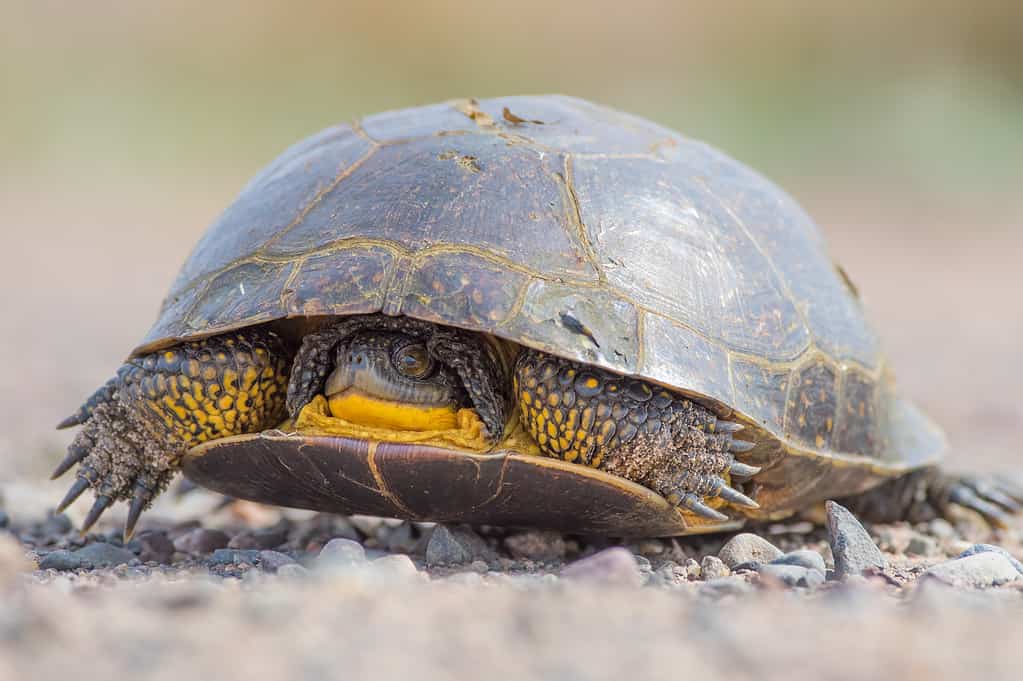
Turtles are some of the most interesting and adorable pets you can own! But knowing turtle costs before the decision to bring one home could make or break your decision.
©BobGrif/iStock via Getty Images
Several factors play into turtle costs, specifically the species, rarity, size, sex, and age of the turtle. Juveniles tend to be more expensive than adults, likely because a healthy juvenile turtle is likely to live another 20 to 40 years.
The source of the pet will also impact the turtle costs, with pet shops and breeders suggesting the highest prices.
Price Range by Turtle Species
| Turtle species | Typical Price range |
|---|---|
| Red-Eared Slider | $10 to $25 |
| Yellow-Bellied Slider Turtle | $10 to $25 |
| Mississippi Map Turtle | $15 to $40 |
| Western Painted Turtle | $15 to $60 |
| Florida Red-Belly Turtle | $20 to $50 |
| Common Snapping Turtle | $20 to $70 |
| Eastern Painted Turtle | $25 to $50 |
| False Map Turtle | $25 to $50 |
| Common Musk Turtle | $25 to $50 |
| Eastern Mud Turtle | $25 to $70 |
| African Side-Neck Turtle | $30 to $100 |
| Chinese Golden Thread Turtle | $40 to $100 |
| Gibba Turtle | $50 to $80 |
| Belize Slider Turtle | $50 to $100 |
| Ornate Box Turtle | $70 to $250 |
| Russian Tortoise | $80 to $250 |
| Twist Neck Turtle | $100 to $200 |
| Spotted Turtle | $100 to $200 |
| Texas Diamondback Terrapin | $150 to $200 |
| Indian Star Tortoise | $500 to $750 |
Where to Find Pet Turtles
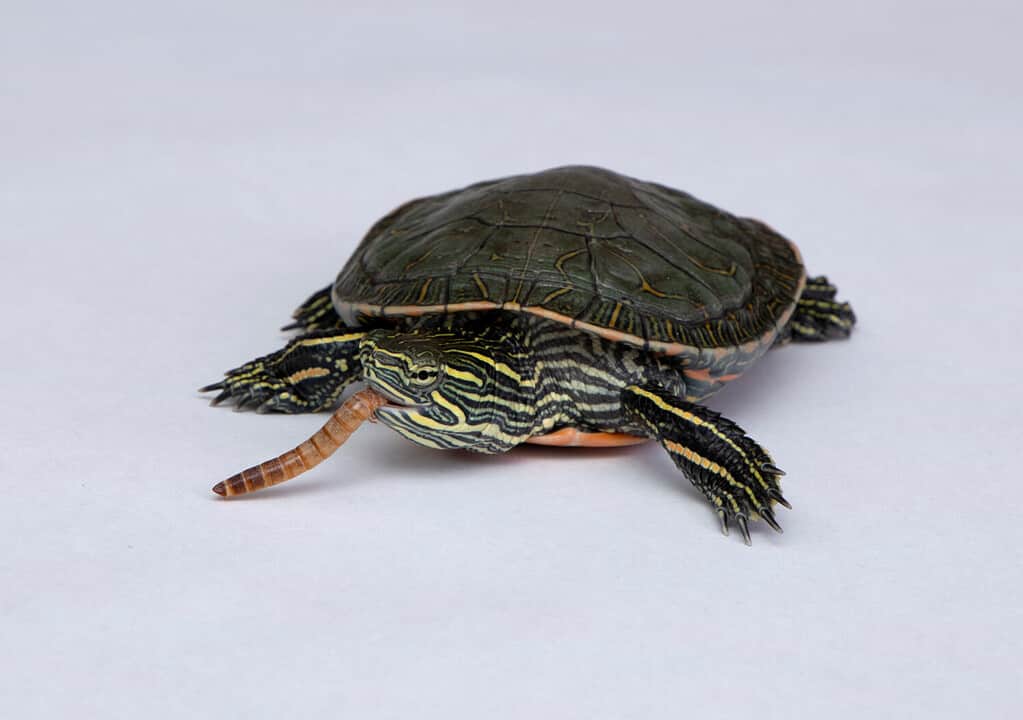
You have to account for care, size, diet, and other matters when you consider bringing home a turtle. These impact the size aquarium you need, the type of food required, and how long your turtle’s life will continue.
©Cat Hammond/Shutterstock.com
You may find turtles in four basic places: rescues and shelters, pet stores, freebie websites like Craigslist or Freecycle, or breeders. The Humane Society recommends only bringing home rescue and adoptive turtles, rather than purchasing via breeders or pet stores because of the often cruel treatment of animals bred for sale. Since turtles live on average between 20 and 40 years, you’re sure to find a life-long friend among the rescued animals.
Freebie Sites
Check for rehoming options via Freecycle.org, OfferUp.com, Craigslist.com, and other similar sites. Often, these turtles come with equipment from the owners who can no longer keep the animals due to downsizing or new responsibilities.
Adoption from Shelters — $10 to $40
In most cases, adopting turtles from rescue shelters will involve a small adoption fee, running between $10 and $40. These are typically turtles that someone needed to rehome but couldn’t find a taker for in time. From shelters, turtles usually come in healthy conditions, since the shelters work to rescue the animals rather than neglect them.
Breeders and Pet Stores — $50 to $100
While the Human Society recommends skipping breeders and retailers, you may still opt for one of these. Turtles aren’t particularly expensive pets, so typically you’ll find just about any species (save some tortoises) for between $50 and $100. Rarer or unique species may cost much more.
Purchase Considerations

Bringing home a wild turtle isn’t a great idea. They may carry salmonella! You’ll also want to have a vet check out your new turtle pal as soon as you bring her home, just to make sure her health is doing all right. The annual vet visit and care is, thankfully, one of the few costs of keeping a pet turtle.
©Ontley, CC BY-SA 3.0 – License
Before you decide on a turtle, be aware that not all pet shops and breeders sell healthy animals. Be sure that the shelter, breeder, or pet shop is legitimate and has a good reputation.
It’s also important to note that selling turtles with shells smaller than 4 inches in length is illegal to prevent the spread of turtle-borne salmonella.
- Check out the environment: how clean is the pet store? How clean is the turtle enclosure? Turtles can be messy but there shouldn’t be dirt, grime, or bad odors in or near the enclosure.
- Take your turtle to the vet immediately after you purchase her. This can help identify any issues right away.
- Ask for pictures of the turtle if purchasing online. This can help you have an idea about the enclosure the turtle is already in, what the shell looks like, and potentially any tell-tale signs of unhealthiness.
- Check for clear eyes on the turtle. Cloudy or swollen eyes indicate illness or disease.
- Look for recent reviews of breeders and pet shops. Old reviews might no longer be accurate.
- Only buy captive-bred turtles. Wildlife turtles are illegal for breeders and stores to sell and there’s good reason for this. Wild-caught turtles may carry illnesses or parasites.
- Look for active, responsive turtles. Inactive or sluggish animals likely are infected with something.
Annual Medical Expenses
If a turtle is healthy, he likely won’t require much medical attention beyond the annual vet visit. The exceptions could be in the case of an emergency. They don’t require vaccinations, dental care, or grooming, so monthly costs only apply to turtles dealing with health conditions.
The most common health concerns for turtles include:
- Respiratory disease
- Abscesses
- Shell infections or fractures
- Parasites
- Vitamin A deficiency
In most cases, the annual vet visit will help you monitor these potential conditions and prevent them from occurring. These visits usually range between $45 and $75, depending on your location.
Research, Research, and Research Some More
Before bringing home a turtle, do your research on the species you’re most interested in. The health, happiness, and safety of your turtle may well depend on your knowledge. This means look into food for the specific species. Learn exactly how big your turtle enclosure needs to be. What temperatures do your turtle need during daytime versus nighttime? What substrate is best? Which basking lamp will provide the right coverage?
Don’t skimp on this step. Instead, spend a good several weeks researching the various species and their needs until you land on the right one for your living situation, your care ability, and your budget. And don’t be afraid to reach out to turtle forums and experts before bringing one home.
Any Legal Requirements for Bringing Home a Turtle

The box turtles of North America have dome-shaped shells which hinge at the bottom. These cuties are pretty fun but there are regulations regarding which turtles may or may not be kept as pets. Many box turtles, for example, may not even be touched in the wild, let alone brought home as pets.
©RenEgAdeRooStEr/Shutterstock.com
Generally speaking, there are no special legal requirements for bringing home turtles from pet stores or breeders. However, there may be some based on the species you choose. For information on box turtles, check out this guide to legal matters concerning box turtles, state by state.
Appropriate Pet Turtle Species
Many species of turtle exist, but many are not appropriate to keep as pets. For example, sea turtles. While they may be tempting, sea turtles are never permitted as pets. The endangered animals may only be cared for by specifically licensed centers and wildlife rescues. If you see hatchlings, eggs, or sea turtles in the wild, do not attempt to touch them or bring them home.
Appropriate species may be found at legitimate pet stores, via breeders, shelters, and other avenues. These include:
- Belize slider turtles
- African side-neck Turtles
- European pond turtles
- Bog turtles
- Eastern mud turtles
- Loggerhead musk turtles (not to be confused with sea turtles!)
- Pink belly side-neck turtles
- Chinese box turtles
- Ouachita map turtles
- Chinese softshell turtles
- Spiny softshell turtles
- Florida softshell turtles
- Desert box turtles
- Mata Mata turtles
- Striped mud turtles
- Diamondback Terrapin turtles
- Spotted turtles
- Ornate wood turtles
- Ornate box turtles
- Razorback musk turtles
- Reeve’s turtles
- Yellow mud turtles
- Common musk turtles
- False map turtles
- Midland painted turtles
- Southern painted turtles
- Red eared slider turtles
- Gulf coast box turtles
- African sideneck turtles
- Mississippi map turtles
- Eastern painted turtles
- Western painted turtles
- Three-toed box turtles
- Eastern box turtles
- Yellow-bellied slider turtles
- Russian tortoises
- Common snapping turtles
- Twist neck turtles
- Gibba turtles
- Indian star tortoises
- Florida red-belly turtles
- Chinese golden thread turtles
Tank Size Required
Tortoises require a minimum of 40 gallons for their tank sizes, while semi-aquatic turtles need at least 29 gallons of space.
Skill Levels and Experiences
Though turtles require specialized care, they are great pets for beginner reptile owners. They’re fairly low-key animals who need the right food, equipment, and enclosures, but generally don’t require intensive knowledge or loads of time for their care.
Living Conditions Required for Turtles
Many species of turtles are semi-aquatic, meaning they need both water and dry areas in their enclosures. Tortoises, on the other hand, are land animals. Their enclosures must provide enough space for movement, water, feeding areas, basking areas, and shelter.
Turtle Enclosures and Equipment Setup Costs

Turtles need places to bask and heat lamps to keep them warm and happy. You’ll need to factor in these turtle costs before setting up your turtle tank. Be sure to choose a high-quality lamp, though, to ensure long-lasting performance and appropriate lighting.
©iStock.com/:Marina Vedernikova
The big up-front cost for your turtle is going to be the aquarium and equipment for setup. Once you have a proper set-up, however, the costs dramatically drop and the monthly costs are fairly low for keeping a turtle.
Aquarium
The aquarium for your turtle’s enclosure is key for providing her with the right environment. It needs to be water-tight and large enough to contain both water for swimming and dry “land” for basking and sleeping. Aquariums come in many sizes and shapes, but for turtles, you want long tanks with tall side to provide the turtle with more usable space. They’re climbers! So, the tanks also need to have screened lids to help prevent them from climbing out of their aquariums unsupervised.
Most decent tanks run between $100 and $500, depending on the size you opt for.
Substrates
A variety of substrates may be chosen for your turtle enclosure. River pebbles are a popular choice for the bottom of the water section of the tank. These are carefully prepared for safe turtle usage, though, not from a river! Typically, these will cost between $15 and $25 per package.
For the dry area of the enclosure, consider reptile mulch or soil, bark, or coconut husk. These require monthly changes, as they are biodegradable and become unhealthy without frequent changes. These substrates may be found at pet stores or online retailers for between $10 to $35.
Filter
Your turtle’s tank needs clean, filtered water that doesn’t contain the nasty contaminants that tap water contains. That means you’ll need to install a water filter for your shell-pal. For the best results, use a filtration system designed for a tank twice the size of your turtle’s. This helps ensure the water truly is as clean and pure as she needs. Filters cost between $70 and $200 on average, though, depending on the size tank, you may find a quality one for less.
Water Conditioner
Using tap water as-is for your turtle will result in your reptile buddy getting sick or at least having a ;ess fulfilled life. The chlorine can seriously hurt turtles. Neutralize the chemicals in the water with water conditioners designed for pet use. These will cost around $10 to $15.
Basking Lamp
Turtles are not fully aquatic, and as reptiles, they need to be able to bask on rocks, driftwood, or other objects under a warm light. You’ll need a basking lamp and fixture to attach to the tank. These together will cost around $45 and $55.
Turtle Ramp, Rock, or Basking Platform

Turtles don’t just spend all day in the water. They also need places to bask in warmth to keep their cold-blooded bodies healthy. Provide them with basking lamps and rocks, driftwood, or platforms where they can keep toasty warm.
©damann/Shutterstock.com
To take advantage of its basking lamp, your turtle will need a ramp, large rock, or basking platform of some kind. Never use a rock you find lying around. These can carry problematic mites and diseases that could infect your turtle. Instead, look to a pet shop or online retailer for a turtle ramp or specially prepared rock. You can also build a homemade platform using an online tutorial. The cost will run between $10 and $30, depending on which route you go.
Aquarium Heater
In most cases, the water in your turtle’s aquarium will drop below safety and comfort levels for your turtle. This means you’ll need a submersible heater to keep the temperature viable for your reptile pal. One of these will run between $20 and $40, depending on how large your tank is.
Thermostat
Since most pet turtles are semi-aquatic, they require both a thermostat for their heat lamp and a thermostat for their water. This means you’ll spend about $50 total for this setup component. If you go for higher quality, you’ll only need to purchase the items once or twice at the most during the turtle’s lifetime.
Turtle Food Costs
Among your regular expenses for turtles, food is a big one. These primarily carnivorous animals require a large amount of their food to be protein. Often, folks use crickets, earthworms, feeder fish, tilapia, or chicken for this. If you’re so inclined, you may create your own cricket farm for cheaper food for your reptile pal.
To begin, many folks recommend starting out your turtle on pre-packaged turtle food. This ensures the turtle receives the necessary nutrients while you learn the ropes of turtle care. Each pack costs about $20 or less and lasts about 1 month. Make sure you provide them with Vitamin D and calcium supplements, as well, which run around $10 per month.
Total Bring Home Turtle Costs
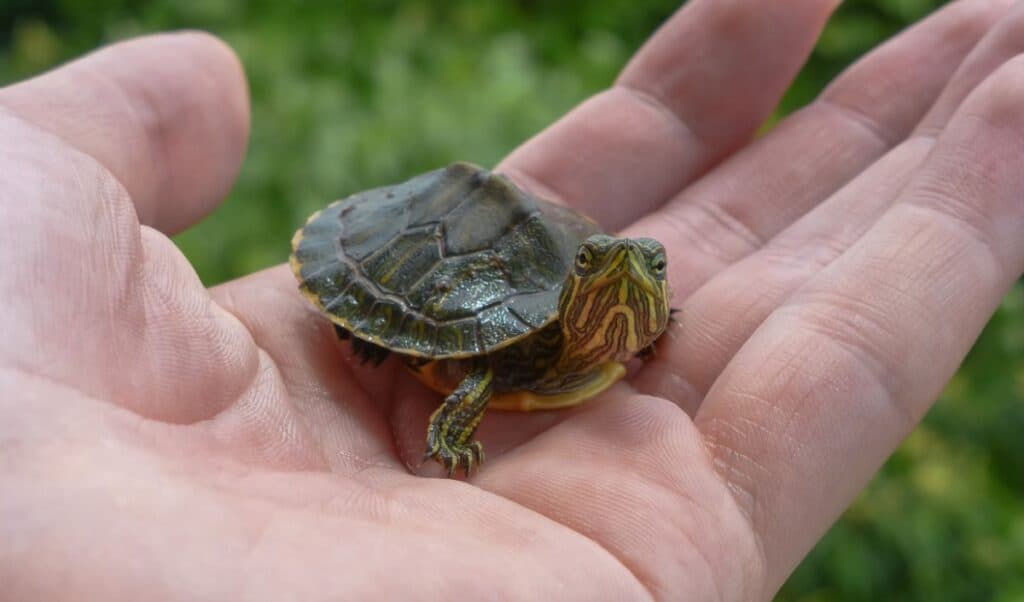
Turtles will cost you a decent bit to bring them home. But once they’re home, they don’t cost that much to care for per month. Bring home costs primarily depend on the age, size, and species of turtle you adopt.
©iStock.com/Pablo Solís Fernández
- Turtle $0 to $100
- Initial vet visit $5 to $75
- Aquarium $100 to $500
- Substrates $25 to $65
- Filter $70 to $200
- Water conditioner $10 to $15
- Basking lamp $45 to $55
- Turtle ramp, rocks, or basking platform $10 to $30
- Aquarium heater $20 to $40
- Thermostat $50
- Turtle food $20
Total Monthly Turtle Costs
On average, your monthly costs for caring for a turtle will run you between $30 to $55 for food and bedding.
Occasionally, you’ll need to replace other equipment and you’ll need to factor in the annual vet visit. If you save $150 to $200 per year for these costs, you’ll be in good shape.
Saving Money on Turtle Care
Turtles are, thankfully, not terribly expensive pets to keep. Not many cost-cutting measures can be found since they already require so little after initial costs. A few, though, could include keeping your own cricket farm, purchasing high-quality food for better health, and maintaining your regular vet visits. These all add up to savings in the long run, even if not today.
Resources for Turtle Pet Care
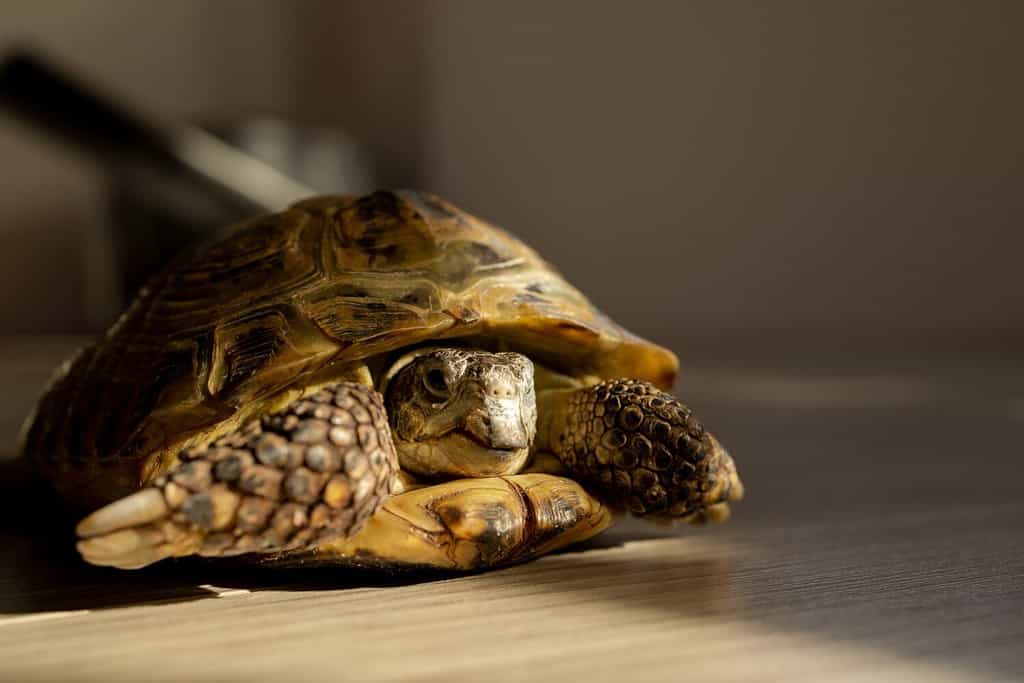
Don’t be afraid to reach out and ask for advice from experts and fellow turtle parents. They can be an important part of your pet turtle’s life. They can help you find creative ways of reducing turtle costs and, more importantly, make sure your turtle is healthy and happy.
©Anna List/Shutterstock.com
Once you bring home your new pet turtle, you may want to reach out for some help along the way. Many forums for turtle care exist, as well as specific species and pet turtle care guides. A few of these could be helpful as you begin.
- PetMD Pet Turtle Care Guide
- PetCo Pet Turtle Care Guide
- Turtle Forum
- Red Ear Slider Forum
- American Box Turtle Forum
- Tortoise Forum
- Musk Turtles Forum
- Koiphen Turtle Forum
- Reptiles Magazine Healthy Turtle Tips
The photo featured at the top of this post is © iStock.com/slowmotiongli
Thank you for reading! Have some feedback for us? Contact the AZ Animals editorial team.







